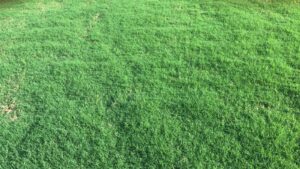Do you want a lush, green lawn that withstands the summer’s heat with ease. In warmer climates, Bermuda grass is the go-to choice for such resilience. But what about the cooler, damp shores of the UK? Can you use Bermuda Grass in the UK?
Bermuda grass, known scientifically as Cynodon dactylon, is a popular turf choice particularly suited for its tolerance to heat and heavy foot traffic. It is a staple in regions where the sun reigns supreme.
In the following article, we’ll delve into the natural habitat of Bermuda grass, explore the specific climates it thrives in, and uncover the reasons why it might not be the dream turf for British gardens.
What is Bermuda Grass?
Bermuda grass, scientifically known as Cynodon dactylon, is a warm-season grass that thrives in hot and dry climates like those found in Southern Europe. It is characterized by its coarse leaves and remarkable resilience, often persisting once it takes hold, which can lead some to consider it weed-like in nature.
Renowned for its exceptional heat and drought tolerance, Bermuda grass is a preferred choice for heavily trafficked areas such as athletic fields and golf course tees. This grass retains its vibrant green color throughout the year in tropical zones, indicating its suitability for locations with a similar climate profile.
Quick to establish itself and with an aggressive growth rate, Bermuda grass is low maintenance when it comes to water requirements, thanks to its drought-tolerant properties. It is able to survive lower rainfall levels and higher temperatures, which contributes to its popularity in drier regions. For lawn owners in appropriate climates, Bermuda grass can be an excellent choice due to its ability to withstand challenging weather conditions.
Characteristics of Bermuda Grass:
- Growth habit: Aggressive, warm-season
- Appearance: Coarse, rough leaves
- Drought tolerance: High
- Maintenance: Low, withstanding low rainfall
- Use: Athletic fields, golf courses
- Climate: Thrives in hot, dry climates

Monaco Bermuda Grass from Barenbrug.
Where in the world is Bermuda Grass commonly used?
Bermuda Grass has garnered recognition for its resilience and adaptability in various regions globally, particularly in areas synonymous with scorching temperatures and sparse rainfall. Favoured for its endurance in hot climates, Bermuda Grass has become the preferred choice in Southern Europe, where the mercury regularly climbs to 30-degrees and beyond. Its remarkable drought tolerance makes it well-suited for these arid conditions.
This robust grass species thrives within USDA Plant Hardiness Zones 7 to 10, marking a wide geographic footprint where its cultivation is optimal. The United States, known for its diverse climatic zones, has many areas where Bermuda Grass is not only used but flourishes throughout the year. In tropical locales, this grass’s ability to stay verdant year-round is highly prized, providing a constant lush landscape.
However, when grown in regions where temperatures plummet under 60 degrees Fahrenheit, Bermuda Grass slips into dormancy, its growth halting until warmth resumes. Its aggressive growth rate, which some while deem beneficial, can sometimes cause issues. In areas it is not deliberately sown, Bermuda Grass can be an invasive challenge, often considered a weed due to the difficulty in its complete removal.
What conditions does Bermuda Grass need to thrive?
Bermuda grass is a robust and adaptable species, famous for its ability to flourish in hot and arid environments, especially where temperatures hover around 30°C. This tough grass has garnered a reputation for being highly drought-tolerant, meaning it can soldier on during spells of scarce rainfall without a hitch. Sunlight is a vital ingredient for the success of Bermuda grass—it thrives under the full glare of the sun but doesn’t shy away from a bit of shade.
Here’s a quick rundown of the conditions Bermuda grass needs to thrive:
- Climate: Prefers warmer climates with high temperatures.
- Drought Tolerance: Can endure periods without much water.
- Sunlight: Loves full sun but can handle partial shade.
- Soil Adaptability: Not fussy about soil types, even grows in salty coastal soils.
- Maintenance: Needs regular care, including monthly fertilization and consistent mowing.
Bermuda grass isn’t just a survivor; it’s a conqueror, known for its aggressive growth. This can be a double-edged sword because while it fills in patches quickly, it also requires frequent mowing to maintain a height of about 1 to 1.5 inches. In summary, Bermuda grass is perfect for those who live in warmer regions and are committed to its upkeep. It’s the preferred grass for athletic fields and golf course tees thanks to these resilient traits.
Why is Bermuda Grass unsuitable for the UK?
Bermuda grass, while a popular choice for athletic fields and golf course tees in warmer climates, is unsuitable for the UK’s distinct environmental conditions. Known for thriving in hot and dry climates, Bermuda grass is adapted to perform well in areas like southern Europe and the southern United States. These regions often fall within the United States Department of Agriculture Zones 7 to 10, where temperatures consistently exceed 30 degrees Celsius and rainfall is lower than average.
In contrast, the UK’s climate is considerably milder and generally wetter, with temperatures rarely sustaining such highs for extended periods. Bermuda grass’s exceptional drought tolerance and aggressive growth rate become redundant in the UK, where these survival traits are not essential. Furthermore, the grass’s peak growth occurs under conditions that are uncommon in Britain. Consequently, maintaining Bermuda grass in the UK could lead to challenges such as frequent overwatering and potential for disease due to excess moisture, not to mention the regular monthly fertilization it would require.
Considering these factors, UK lawn owners are better served by grass varieties that are adapted to cooler temperatures and can handle the nation’s more frequent rainfall.
|
Climate Factor |
Bermuda Grass Preference |
UK Condition |
|---|---|---|
|
Temperature |
Above 30°C |
Mild |
|
Rainfall |
Low |
Higher and frequent |
|
Soil Type |
Can survive shallow soil |
Varied soil types |
|
Growth Requirements |
High heat & drought |
Milder climate |